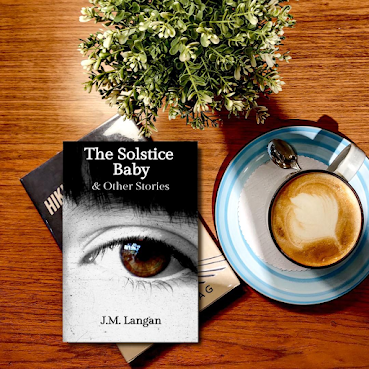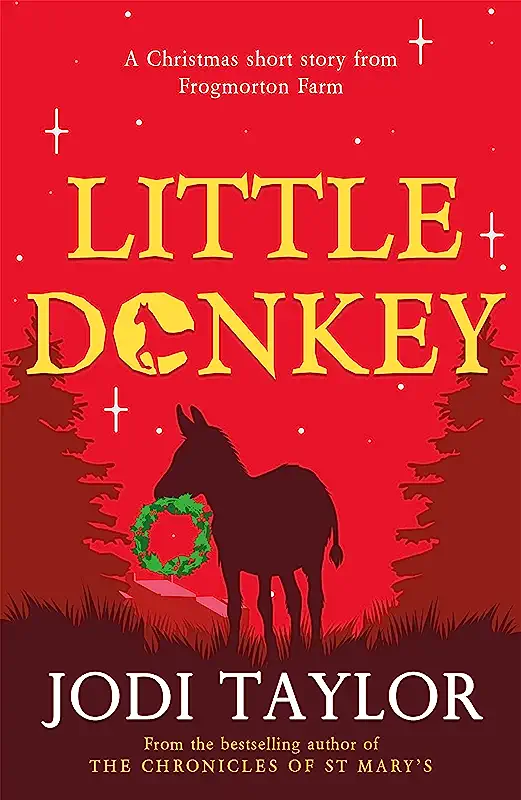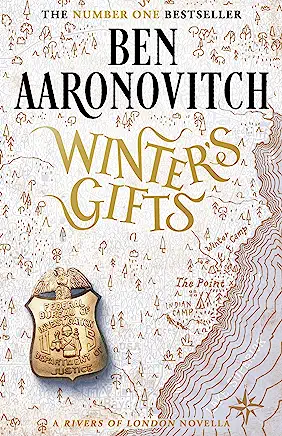If you are a regular reader of this blog, you’ll know that Jane Langan studied on the MA in Creative Writing at the same time as me and she has appeared on these pages several times before. I reviewed her self-published book of poetry, Blood Kisses, when it came out and she was spotlighted in my monthly showcase at the end of April this year.
Jane recently published this collection of short stories. Some were first published
elsewhere, such as in Makarelle, the literary journal she co-edited with
two other MA alumni, Ruth Loten and Dini Armstrong. Others have been written
for competitions or specifically for this collection.
One thing they
have in common is that they are brilliant. Knowing I was going to write this
review today, I re-read a large number of the stories in bed last night, and I
was, yet again, absolutely blown away by them.
The tales in this
collection are an eclectic and wide-ranging mix. My favourites are the fairytales for
grown-ups, but there were stories I loved in every section of the book. In
fact, I don’t think I came across a story I disliked, though they do vary in
quality of course. Langan gives a lucid introduction, explaining how she has organized
the work under different headings, so there is something that will appeal to
everyone. The links in the Kindle version made it very easy to move
from the contents list to individual stories, and I have to say that the Kindle
edition is very good. The paperback is also beautifully presented and set out
very clearly and logically.
I know that Jane
has taken great pains to proof-read the stories, but I did come across a number
of minor technical errors as I read – missing full-stops, occasional spelling
errors (tic-a-tape instead of ticker-tape, for example), the odd clumsy
sentence. However, I have read hundreds of self-published books (and ones
published by traditional publishers too) which all seem to have such errors in them
– often much, much worse than in this collection. So, I have decided that it
doesn’t matter. The errors are small and don’t affect the reading enjoyment. I
mention them purely on the grounds of full disclosure. In her Q & A below,
she acknowledges her own difficulties with ‘grammar’ but in fact I found the
stories to be well-written in all the ways that truly matter when it comes to
reader-enjoyment. Yes, there are occasional minor glitches, but Jane writes
with confidence, in a pacy readable style, and the odd missing punctuation mark
will not spoil your pleasure in these terrific tales.
The problem with
reading work by people you know, people who are members of your writing group,
people who you think of as friends, is that it is sometimes difficult to get
over that barrier of viewing them as still being ‘learners’ as writers. As I read through
these stories, I suddenly realized that I had leapt over that barrier - I found
myself forgetting it was ‘lovely Jane’ from the Masters course who’d written
these stories, and suddenly seeing her work through new eyes, proper reader-eyes. This writing is
professional, confident and highly imaginative, and I was immediately drawn
into the worlds she has created here.
There is no obvious way to sum-up such a wide variety of narratives, but for what it's worth I particularly enjoyed 'The Self-Cleaning Woman' (for its honesty), 'The Solstice Baby', 'Puca', 'The Queen and The Soldier', 'A Scattering Of Boys', 'Book Club', 'Fairy Clocks'. But actually I enjoyed every story I read - I still have a few left to savour at my leisure. It is unusual for me to not find some story to complain about in a collection, particularly one as varied and full of stories as this one.
Langan has an interesting imagination and she writes fearlessly, with a mischievous streak. Her characters are realistic, her dialogue authentic, her descriptions often original and delightful. Many of her tales are flash fiction, and most of the ones that aren't are relatively short, which makes them easy to dip into. I love her fantasy stories but she writes realism equally well and I would imagine most readers would find something in this volume to entertain them, and make them think.
Rating: ***** HIGHLY RECOMMENDED
Q & A
What inspired you to write this book?
Answer: That’s a tricky question as each story came from a
different place. Some of the stories, like Púca and
The China Doll were written for my masters in creative writing with the Open
University (OU). Others came from writing prompts or just out of my
imagination. The Solstice Baby story is a version of my story. I’m adopted and
my parents got me on the Winter Solstice. Other than that the story is pure
fiction.
What did you learn from writing your book?
Answer: I have always written something. I have written a
diary since I was a child and still do. I have written a blog since 2009. I
have written poetry and stories in the back of notebooks for years. I just
decided, around the time I was fifty, that I should stop putting them at the
back of the books and bring them to the front.
What I have learned is that writing is a job. You
need to set time aside for it and then put your pen to paper or fingers to the
keyboard and just write – it may be nonsense and it may be nothing. But
occasionally a gem of a thing emerges. I have also learned my grammar is
rubbish and I have to work really hard to ensure it isn’t!
I also learned, when I was editing The Solstice
Baby and Other Stories, that all these stories hold up in their own right
(in my opinion) even the ones I thought weren’t as good after I had just
written them. They are a body of work which I have poured and stressed over and
I should be proud of that.
Which is your favourite story in
your book?
Answer: That’s like choosing a favourite child, but if I must
– I like Socks. It’s a 50-word story that really gets to the essence of being a
parent. For a longer piece, probably Púca – not necessarily because I think it
is the best story, but because I poured everything I had into it. It was the
first story I handed in as coursework for the OU. It has been rewritten,
renamed and re-edited. It is also, probably, the closest to the style of fiction
I like best. I like stories set in reality, but with a twist.
You say you treat writing as a job,
how many hours a day do you write?
Answer: My day starts at 9am and usually finishes about 3pm so I can cook dinner for my family – my husband works shifts and my youngest daughter gets in about 4pm after school and they are usually famished. I can’t always write all day – like most writers I have a side hustle. I have a little shop on Etsy that sells gifts and curated vintage things.
Most mornings I fill in the spreadsheet to show what I have sold, print out packing slips and postage labels and at lunch time package items up. I go to the post office every other day, except at Christmas time when it gets really busy and I have to go daily. After I have done that, I check the Castle Priory Press email and respond to any queries there, if Ruth hasn’t got there first. I also make any amendments to the website etc.
After that, it’s time to write – usually by
about 10am – 11am. I write poetry, short stories and novels. When I am novel
writing, I tend to be quite focused and do nothing but that. When I am working
on poetry or short stories, I also look at competitions I can enter or
magazines who are looking for submissions. Sometimes, If I don’t feel I have
done enough, I will work in the evenings, especially if my husband is on the
late shift.
If you had to do something
differently as a child or teenager in order to become a better writer as an
adult, what would you do?
Answer: I was quite wild as a teenager, but always into reading and writing. The only O level I got an A in was English Literature. I also did OK in English Language – although I think the curriculum back then let me down, which I realised when I came to do my BA and realised how awful my grammar was. That stopped me writing. My first degree was in Drama and English Literature. In the first year, my English lecturer made me feel like a complete idiot, sent me to ‘special’ classes to help my grammar and made me rewrite numerous essays. I only just scraped through my first year. The whole thing bashed my confidence and I stopped writing creatively for a quite a while. If that hadn’t happened, I think I would have gone down the Master’s route sooner. And the more I write, I believe, the better I become at it.
I read somewhere that it takes about six novels to become a good novel writer – I have written three. The first still needs so much editing, it scares me. The second is in a good place but I know it could be better. The third is written but again needs editing. So, I just have three more to go and then, who knows?
The link to the book is here: https://mybook.to/SolsticeBaby
Interested
in Hybrid Self-Publishing - www.CastlePrioryPress.com
Jane's personal blog - http://howilikemycoffee.co.uk
Jane's little shop of beautiful gifts - https://www.etsy.com/uk/shop/HowILikeMyCoffee
***
And here are a few other books I've read this month:
The Good, The Bad and The History [book 14, the final novel in the St Mary’s Chronicles series) by Jodie Taylor
For fans of Jodi Taylor, this final instalment in the St Mary’s Chronicles provides a satisfying ending to the series, while leading into her spin-off Time Police series (the Time Police series consists of at least four novels already published, so this is a nice touch for a series about time travel!). It is fast-paced, tense, very funny and full of all the pleasures Taylor’s readers have come to expect. Great fun and an excellent conclusion to a brilliant series.
When I was doing my MA in Creative Writing, one dreadful
useless tutor told a fellow student that his excellent fantasy novel didn’t
work because ‘no one believes in time travel, do they?’. This shows such a lack
of understanding about the way fantasy and sci fi work that it defeats
understanding. If the success of Dr Who wasn’t enough to convince this tutor
that time-travel stories are popular, Jodi Taylor’s Chronicles of St Mary’s
ought to do the trick.
Exciting, funny, satisfying
Rating:
**** recommended
The Nothing Girl, The Something Girl, Joy To The
World by Jodi Taylor (The Frogmorten Farm series)

I gave my old Kindle to my sister as she is a huge Jodi Taylor fan and could read my copies of the books on there, and she read these three books which I had uploaded onto it at some point but never read myself as they didn't appeal to me. My sister told me she'd enjoyed them, so, looking for something light and easy to read in bed, I decided to give them a go.
Delightful, restful, cozy.
Rating:
*** Worth reading if you enjoy 'cozy'
Winter Gifts by Ben
Aaronovitch (a novella, part of the Peter Grant series)
Our hero Peter Grant doesn’t feature in this novella, though he is mentioned. Well away from the usual setting in London, this story is set in a snow-covered north Wisconsin and stars FBI Special Agent Kimberley Reynolds.
I was expecting not to like it much, as I’ve never
really warmed to Kimberley when she’s appeared in Peter’s stories, so I was
reading it out of an OCD-ish desire for completion and a feeling of brand-loyalty.
However, I actually thoroughly enjoyed it. It’s exciting from beginning to end,
with a genuinely scary supernatural threat, interesting characters and the pace
just never lets up. I found it unputdownable.
Rating: ***** Highly Recommended







Interesting interview and review. Well done Lou and Jane.
ReplyDeleteThanks for reading the blog. Glad you enjoyed it.
DeleteI enjoyed this. Especially pleased with the layout - very professional. Would that I could replicate the format (and style!).
ReplyDelete